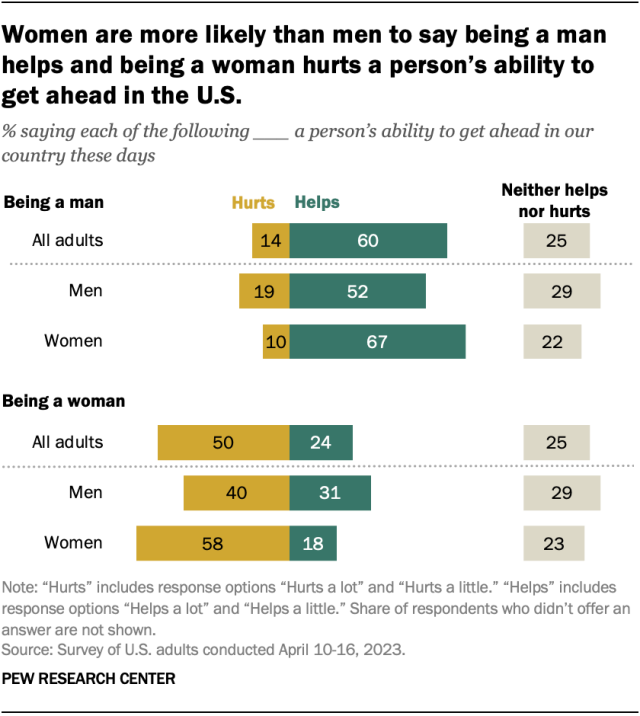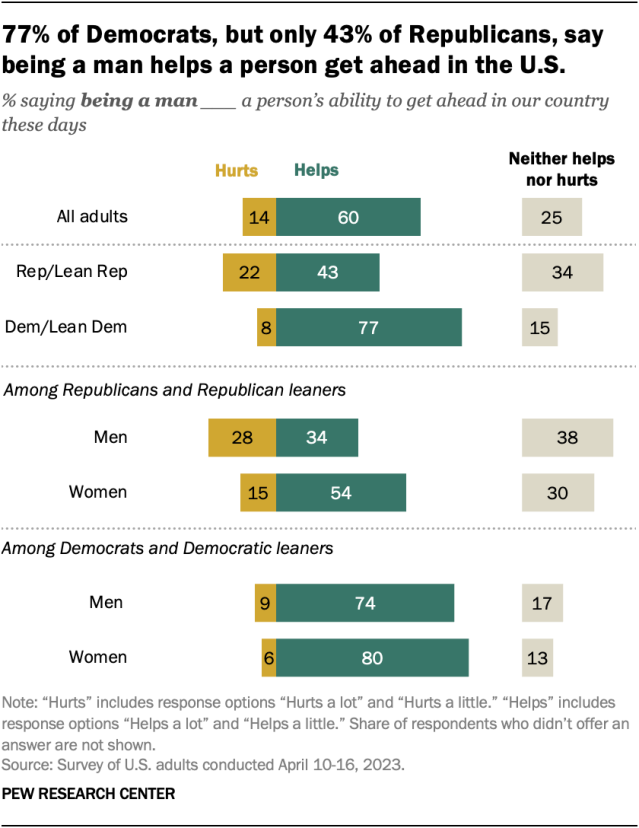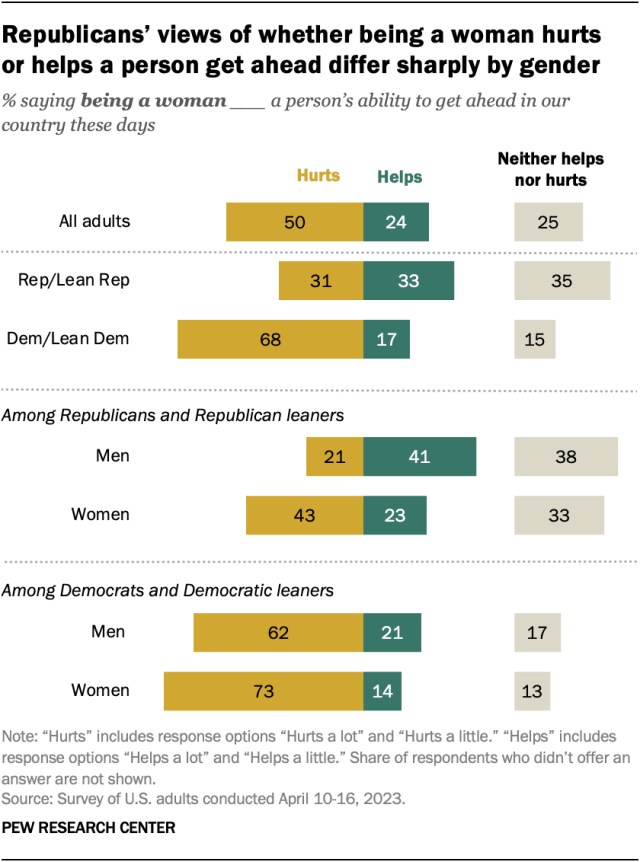More Americans say being a man helps than hurts a person’s ability to get ahead in the United States these days, according to a recent Pew Research Center survey. By contrast, more Americans say being a woman hurts rather than helps.
Pew Research Center conducted this analysis to better understand Americans’ views of whether being a man or a woman hurts or helps a person’s ability to get ahead in the United States these days and how those views differ among key demographic groups.
This analysis is based on a survey of 5,073 U.S. adults conducted April 10-16, 2023. Everyone who took part is a member of the Center’s American Trends Panel (ATP), an online survey panel that is recruited through national, random sampling of residential addresses. Address-based sampling ensures that nearly all U.S. adults have a chance of selection. The survey is weighted to be representative of the U.S. adult population by gender, race, ethnicity, partisan affiliation, education and other categories. Read more about the ATP’s methodology.
Here are the questions used for this analysis, along with responses, and the survey methodology.

Six-in-ten U.S. adults say being a man helps a lot or a little when it comes to a person’s ability to get ahead in the U.S., compared with 14% who say it hurts (either a lot or a little). The picture is very different when it comes to being a woman: Half of adults say this hurts a person’s ability to get ahead and 24% say it helps.
Views about whether being a man or a woman helps or hurts have not changed much since we asked these questions in 2019 and 2020. And as in the past, there are significant differences among key demographic groups in people’s perceptions of the advantages or disadvantages of being a man or woman in the U.S. today.
Does being a man help or hurt a person’s ability to get ahead in the U.S.?
Some 67% of women say being a man helps a person’s ability to get ahead at least a little, including 48% who say it helps a lot. By comparison, 52% of men say being a man helps, and 28% say it helps a lot.
Gender gaps on this question persist among White adults, but there are no differences between Black or Hispanic women and men on whether being a man helps. (The number of Asian women and men surveyed is too small to analyze their responses separately.)

Women younger than 30 are more likely than women ages 30 and older to say being a man helps a person get ahead (76% vs. 64%). There are no age differences among men on whether being a man helps or hurts.
Similarly, women with different levels of education have varying views of whether men have an advantage based on their gender. Women with a bachelor’s degree or more education are more likely than those with some college or less education to say that being a man helps (79% vs. 61%). Among men, there are no differences in views by these education levels.
There are also partisan differences on whether being a man helps or hurts a person’s ability to get ahead. Among Republicans and independents who lean toward the GOP, 43% say being a man helps, 22% say it hurts and 34% say it neither helps nor hurts. By comparison, 77% of Democrats and independents who lean toward the Democratic Party say being a man helps.
There are wide gender gaps on this question among Republicans and smaller gaps among Democrats. Some 54% of Republican women say being a man helps a person get ahead, compared with 34% of Republican men. In turn, Republican men are more likely than Republican women to say being a man hurts (28% vs. 15%). Among Democrats, majorities of men and women say being a man helps, but women are more likely than men to say this.
Does being a woman help or hurt a person’s ability to get ahead in the U.S.?

There are also large differences across demographic groups in views of whether being a woman helps or hurts someone’s ability to get ahead.
A majority of women (58%) say being a woman hurts, but fewer than half of men (40%) agree.
Among both White and Black Americans, women are more likely than men to say being a woman hurts a person’s ability to get ahead. However, there are no differences on this question between Hispanic women and men. (The number of Asian women and men surveyed is too small to analyze their responses separately.)
Among women and men alike, younger adults are more likely than older adults to say that being a woman hurts when it comes to getting ahead in the U.S. these days.
Some 70% of women younger than 30 say being a woman hurts in this respect, while 55% of women ages 30 and older say the same. And half of men younger than 30 say this, compared with 37% of men 30 and older.
Women with more education are also more likely than those with less education to say that being a woman hurts when it comes to getting ahead. While 68% of women with at least a bachelor’s degree say this, 53% of those with some college or less education say the same. There are no differences by education level among men.
When looking at party affiliation, Republicans’ views are mixed. Similar shares of Republicans say being a woman helps (33%) and hurts (31%) a person’s ability to get ahead, while 35% say it neither helps nor hurts. Among Democrats, a majority (68%) say being a woman hurts when it comes to getting ahead.
There are again large gender differences among Republicans and smaller ones among Democrats. Republican women are about twice as likely as their male counterparts to say that being a woman hurts (43% vs 21%). In turn, 41% of Republican men say being a woman helps, compared with 23% of Republican women. Among Democrats, majorities of men and women say that being a woman hurts, but women are more likely than men to say this.
Note: Here are the questions used for this analysis, along with responses, and the survey methodology.
